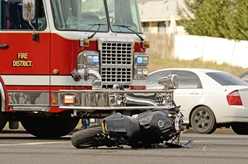
Many motorcycle riders love the freedom of riding a motorcycle and the cost saving on gas. Unfortunately, riding a motorcycle is not always fun. It can be extremely dangerous for the motorcyclist. According to a Governors Highway Safety Association (GHSA) Preliminary Report, 4,586 motorcyclists died in wrecks in 2014—14 percent of all traffic fatalities. GHSA estimates that fatalities would increase by 10 percent nationwide in 2015. Fortunately, deaths in Georgia were estimated to decrease by six percent. However, any death in a senseless accident is one too many deaths.
Common Reasons Motorcycle Accidents Occur
Motorcycle crashes are more deadly than when two motor vehicles collide because of the greater weight of the motor vehicle and the lack of protection a motorcycle rider has. A motorcyclist only has his helmet—if he wears one—and his clothes. Common causes of these wrecks include:
- Lack of Visibility. No matter how a motorcycle accident happens, one of the contributing causes is often that the driver of the passenger vehicle did not see the motorcycle until it was too late. This happens not because the motorcyclist was doing anything wrong, but rather due to the motorist not being alert enough to see him. When the cyclist is in the driver’s blind spot or is driving at night or in poor weather, visibility can become even more of a problem.
- Head-on collisions. These crashes can be especially dangerous for motorcyclists due to the force of the impact—especially if the vehicles are traveling at a high speed—and the lack of time to take any avoidance measures. Head-on collisions frequently result in the motorcyclist suffering devastating injuries or dying.
- Left–hand turns. Motorists making left-hand turns at intersections are a danger for any vehicle. However, motorcyclists are even at more risk of being involved in one of these crashes because of the problems with visibility due to the small size of their cycles and driver inattention. In most cases, the driver hitting the motorcycle will be found at fault for causing the crash.
- Speeding. If excessive, speeding can be a form of aggressive driving. Not surprisingly, when drivers speed, the likelihood that the motorcyclist will suffer catastrophic injuries or die increases significantly due to the greater force of the impact.
- Lane splitting. When a motorcycle rider drives between two lanes of stopped or slowed traffic, this is known as lane splitting. While legal in a few states, it is illegal in Georgia. Lane splitting can cause crashes due to the close proximity of the motorcycle to other cars and trucks, the reduced speed at which the motorcyclist must maneuver, and the lack of visibility to unsuspecting motorists. Since it is illegal to do this, the motorcycle rider could be found at fault in causing this type of crash.
- Impaired driving. Driving under the influence of alcohol or drugs is not safe—for motorists and motorcycle riders. Sadly, when drivers are intoxicated, they are less likely to see the motorcycle, can make poor judgments in general, such as speeding or turning left into a motorcyclist, or have slower reaction times—all contributing to a crash.
- Rear-end collisions. When motorists do not leave sufficient space between themselves and the motorcyclist in front of them, they can cause a rear-end collision. These are much more deadly for a motorcycle rider than when only passenger vehicles are involved. A motorcyclist can be thrown off his bike if it cart-wheels in the crash.
- Open-door accidents. In busy urban areas, such as in the Atlanta area, motorcyclists can be injured when a driver of a passenger vehicle or truck parked along the street fails to look before opening his vehicle door right into the motorcycle.
- High performance motorcycles. While there are not that many high performance motorcycles on the roads, they tend to be involved in a greater percentage of accidents—resulting in significantly more deaths of motorcyclists.
First Steps You Should Take After a Motorcycle Accident
If you were injured in one of these types of motorcycle crashes, you should take immediate steps to protect your claim for compensation. These should be some of your first actions after your wreck:
- Seek medical care—even if you are not certain you were injured
- Call the police and make an accident report
- Get contact information from the other driver and any witnesses
- Take photographs of the accident scene, the vehicles, and your injuries
- Call an experienced motorcycle accident attorney as soon as possible
Attorney David Brauns is here to take the burden of building your case against the negligent driver and negotiating with his insurance company off your shoulders. Fill out our firm’s contact form to schedule a free case evaluation with David.
Related Links:
- The Dangers Aggressive Drivers Pose to Motorcyclists
- Are Motorcycle Accidents Different From Car Accidents?
- Motorcycle Helmet Use May Affect Your Accident Claim














